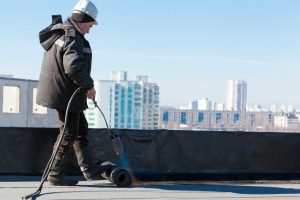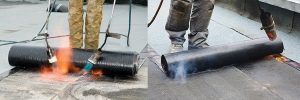Exploring the Pinnacle of Waterproofing
The Importance of Strong Waterproofing
Waterproofing is a critical aspect of construction and maintenance. It shields structures from water damage, which can be not only costly to repair but also hazardous to the integrity of a building. In this article, we delve into the strongest waterproofing methods available, ensuring the utmost protection against water intrusion.

1. Polyurethane Coatings
The Versatile Power of Polyurethane
Polyurethane coatings are renowned for their versatility and high-performance capabilities in waterproofing. These coatings create a strong, seamless barrier that can be applied to various surfaces, including roofs, walls, and foundations. Here’s why polyurethane is considered one of the strongest waterproofing options:
Key Advantages of Polyurethane Coatings
- Seamless Protection: Polyurethane forms a continuous, impermeable layer that effectively keeps water out.
- Durability: These coatings can withstand harsh weather conditions and UV exposure, maintaining their strength over time.
- Flexibility: Polyurethane is flexible and can adapt to the movement of building materials without cracking or peeling.
- Chemical Resistance: It resists damage from chemicals and is suitable for industrial applications.
2. EPDM Roofing
EPDM’s Superior Resilience
EPDM (ethylene propylene diene terpolymer) roofing is another strong contender in the world of waterproofing. It is commonly used on flat or low-slope roofs and offers exceptional waterproofing strength:
Benefits of EPDM Roofing
- Proven Performance: EPDM has a long track record of providing robust protection against water infiltration.
- Resistance to the Elements: It can withstand extreme temperatures, UV exposure, and harsh weather conditions without degrading.
- Low Maintenance: EPDM requires minimal maintenance, reducing long-term costs.
- Longevity: With proper care, EPDM roofs can last for several decades, making them a cost-effective choice.
3. Concrete Waterproofing
The Strength of Concrete
When it comes to building foundations and basements, concrete waterproofing is an indispensable choice. Properly treated concrete can offer exceptional strength against water penetration:
Advantages of Concrete Waterproofing
- Integrated Protection: Waterproof additives or coatings can be mixed into the concrete during construction, creating a water-resistant structure from the start.
- Structural Integrity: Concrete’s inherent strength complements its waterproofing capabilities, ensuring the foundation’s longevity.
- Versatility: Concrete waterproofing can be applied in various forms, such as membranes or crystalline admixtures.
- Cost-Effective: It is a budget-friendly solution that offers robust protection over time.
4. Liquid Rubber Coatings
The Seal of Liquid Rubber
Liquid rubber coatings are known for their exceptional sealing properties. They are widely used in roofing, tank lining, and other applications where superior waterproofing is a must:

Why Liquid Rubber is a Strong Choice
- Monolithic Seal: Liquid rubber forms a seamless, monolithic barrier that leaves no room for water to infiltrate.
- Resilience: It endures extreme temperature fluctuations, making it suitable for both cold and hot climates.
- Easy Application: Liquid rubber can be applied with relative ease, reducing installation time and costs.
- Long-Lasting: Its durability ensures long-term waterproofing protection, even in the face of harsh environmental conditions.
5. TPO Roofing
TPO’s Impenetrable Shield
Thermoplastic Olefin (TPO) roofing is a popular choice for flat and low-slope roofs. It’s known for its strength and resistance to water intrusion:
Advantages of TPO Roofing
- Energy Efficiency: TPO roofs reflect sunlight, reducing cooling costs and contributing to energy savings.
- Strength and Flexibility: TPO combines the strength of rubber with the flexibility of plastic, making it resilient and long-lasting.
- Resistance to UV and Chemicals: TPO is highly resistant to UV rays and chemical exposure, ensuring its durability.
- Easy Maintenance: It requires minimal maintenance, saving you time and money in the long run.
Choosing the Right Waterproofing Solution
Factors to Consider
When selecting the strongest waterproofing method for your project, consider the following factors:
Project Type
Assess whether you need waterproofing for a roof, foundation, basement, or other surfaces. Different methods may be more suitable for specific applications.
Climate and Environment
Consider the local climate and environmental conditions, as they can affect the performance of waterproofing materials. Some solutions may excel in extreme temperatures, while others may be more appropriate for mild climates.
Budget
Your budget will also play a significant role in determining the best waterproofing method. While some options may provide superior strength, they could be cost-prohibitive for certain projects.
Maintenance Requirements
Think about the level of maintenance you’re willing to commit to over the long term. Some waterproofing solutions require minimal upkeep, while others may demand more regular attention.
By carefully evaluating these factors and consulting with experts, you can make an informed decision on the strongest waterproofing method that aligns with your needs and budget. Remember that the right choice can lead to long-lasting protection and peace of mind.

